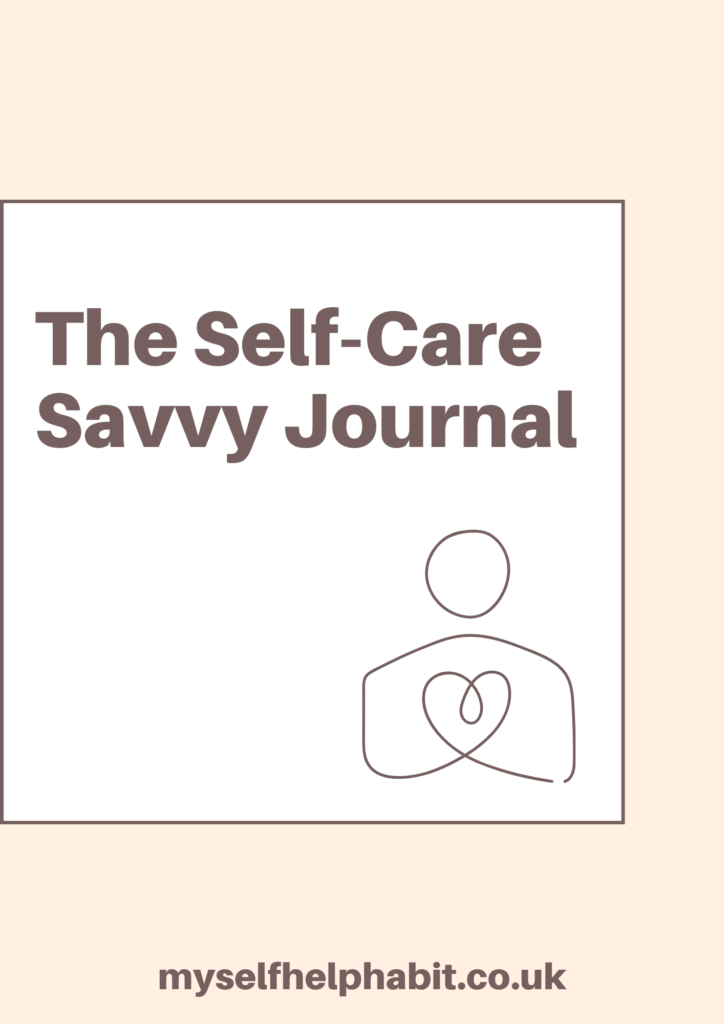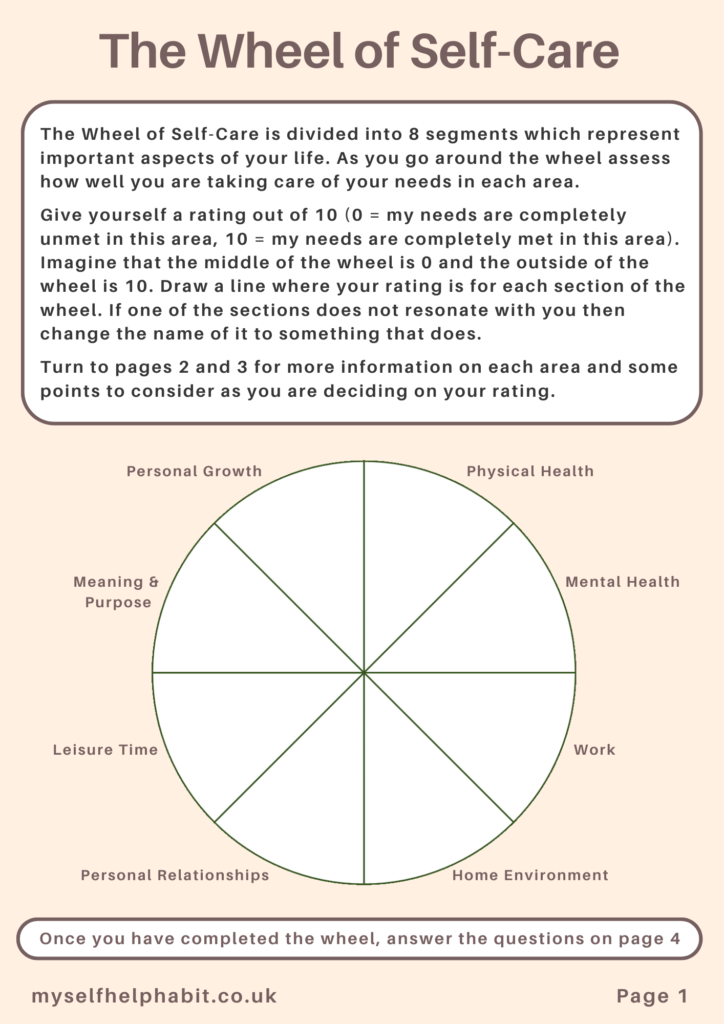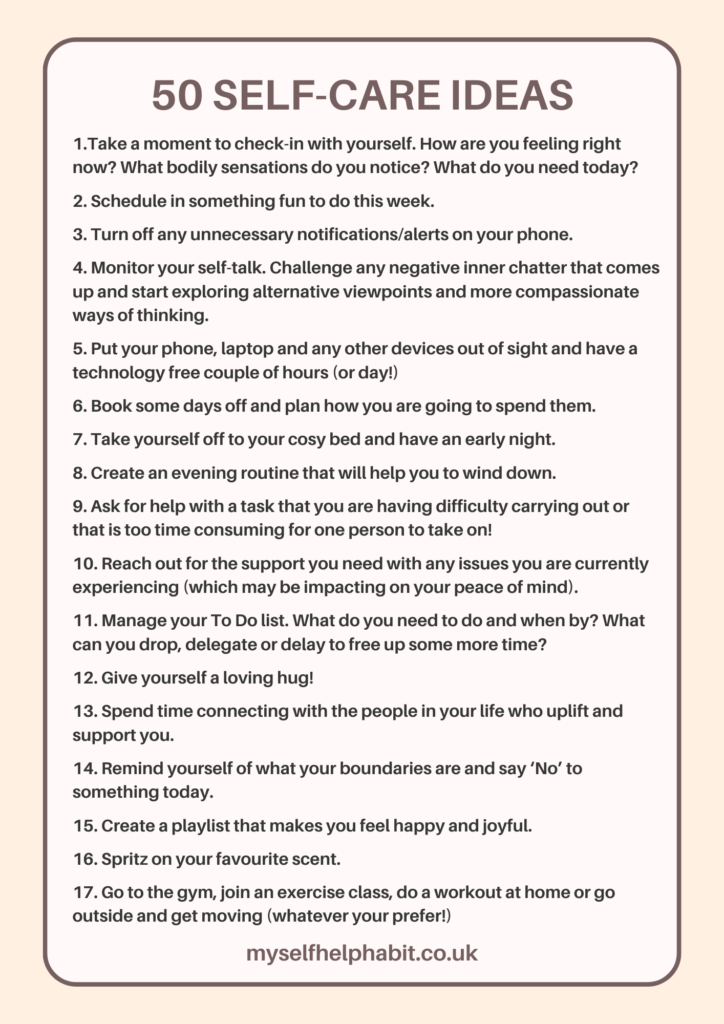
Build a self-care routine that serves you!
I must admit that my level of self-care has been pretty minimal at times. I particularly remember when my children were very young and I would find myself caught up in a flurry of feeds, nappy changing, playing, medical appointments and, because I like to make life extra challenging, I was studying at the same time! So, self-care was not on the radar much, apart from getting sleep…and a good night’s sleep was like gold!
I also experienced a lot of guilt around self-care. If I did relax and make time for myself I would worry that I was not doing something important around the house (because my own care did not seem as vital as a household chore…) I also felt that I was being a bit selfish for wanting some ‘me time’ and was concerned that I was depriving my husband and children in some way if they did not have my undivided attention. The consequence of all this was that I ended up feeling resentful, stressed, and completely worn out. I even experienced a loss of self as I cast aside my own needs and all the activities that I used to enjoy.
Inevitably, it all came to a head, and my body forced me to a grinding halt. After going through a mental health crisis, I realised how essential it was to have a self-care routine in place. I started to add some healthy habits into my day in order to take better care of my physical and mental health. Now, I wouldn’t say that I have self-care completely sussed, there are still moments when it is tempting to push my self-care to one side (this is usually when life gets mega busy!) However, I am much better than I used to be at carving out that precious and necessary space for myself. I also have some non-negotiable self-care activities that I do daily and these never fail me!
This post guides you through the fundamentals of self-care, starting with a definition of what self-care is and why it is important. It uncovers some common beliefs and behaviours that stop you from prioritising your self-care and encourages you to consider how you will overcome such barriers. You will also learn to spot the self-care activities that would benefit you the most and then discover how to build them into your routine in a sustainable way.
In addition, there are plenty of free exercises for you to take away!
- Complete the Self-Care Savvy Journal for a deeper exploration of your current approach to self-care and the beliefs you hold around it.
- Assess how well you are taking care of yourself in key areas of your life and determine what type of self-care you need by completing the Wheel of Self-Care.
- Just looking for some simple self-care ideas? Download the list of 50 Self-Care Ideas and select the activities that most appeal to you.
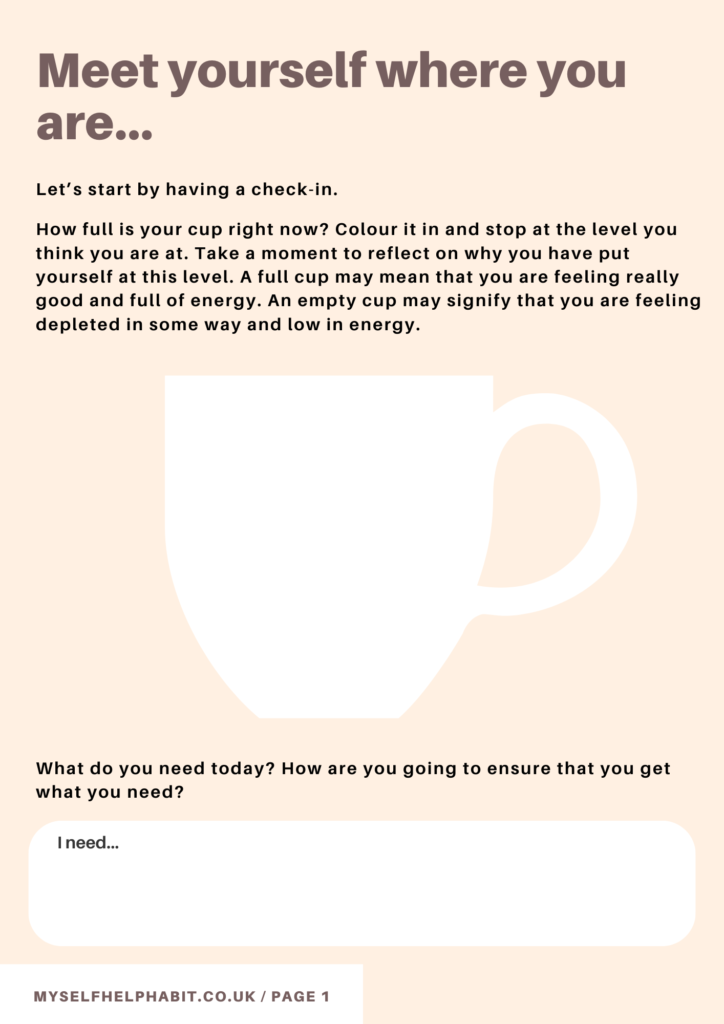
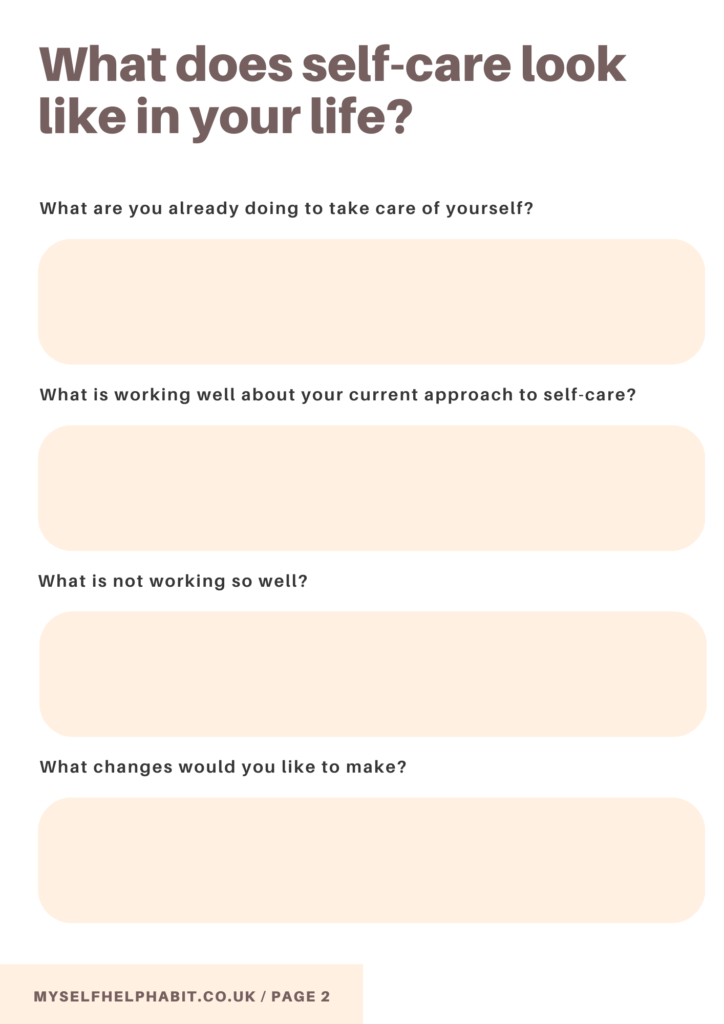
*Disclosure: If you buy books linked to my site, I may earn a commission from Bookshop.org, whose fees support independent bookshops.
What is self-care?
I like to think of it very simply as taking good care of yourself!
Self-care is holistic and involves carrying out a range of daily, weekly and monthly activities that meet your physical, mental, emotional, and relational needs.
We all take care of ourselves on some level, even if it is just ensuring that our basic needs are met, such as sleeping, eating, and staying hydrated. However, self-care goes beyond the basics and gets us to question whether we are getting the sleep we actually need or the type of diet that keeps us well nourished.
Self-care isn’t something that you only do once you have let yourself get to the point of exhaustion. It’s about making sure that you undertake those daily or weekly activities that help to ‘fill up your tank’ so that you are not running on empty. It also isn’t something that you have to ‘earn’ before you do it! Far from being a ‘nice to have’ in our lives, it is an absolute necessity.
What might happen if we don’t take care of ourselves?
There are a number of ways that our well-being can suffer if we do not engage in self-care practices. For example, we may become:
- Physically unwell
- Depleted and low in energy
- Stressed
- Overwhelmed
- Unable to switch off
- Fatigued
- Irritable
- Resentful of others
- Lonely and isolated
- Detached from ourselves (for example, in knowing who we are, what we need, what interests us and brings us joy, etc.)
What are the benefits of self-care?
Self-care is a really positive activity to do because:
- It can make you feel healthier
- You will be better able to manage your mood
- You will feel replenished and ready to tackle that ‘To Do’ list
- You will be able to give to others because you are nourished and energised (so it is not at all selfish!)
- You become a role model for others (they will see you taking care of yourself and may then feel they can do the same for themselves)
- You will develop greater self-awareness and with that comes clarity and direction. You will become better at checking-in with yourself, getting curious about your experiences, and knowing what you want and need.
- You will be equipped with tools that help to build your resilience and prepare you to face the challenges that life brings.
- It can help to build your self-esteem. As you do things to take care of yourself, you are sending a message to yourself that you matter and are deserving of care.
What stops you from prioritising self-care?
Sometimes we know that we are in need of a good dose of self-care but we don’t always act on it. So, what stops us? This will be different for everybody and it is useful to reflect upon this question so that you can identify your own barriers.
However, here are some common issues that stop us from giving ourselves the care we need:
- People pleasing – Constantly trying to live up to other people’s expectations and standards, looking for approval from others, putting their feelings and wishes first, and trying to keep everyone happy, can mean that you sideline your own needs, opinions and desires.
- Lack of boundaries – This may look like taking on way too much responsibility for tasks or helping others, tolerating behaviours that deep down you find unacceptable, saying yes to everything, putting your needs aside, and not valuing your personal time.
- Our beliefs around self-care – What thoughts or beliefs do you have that might be preventing you from taking care of yourself? What goes through your mind when you think about self-care? If you have recently done a self-care activity, what came up for you as you were doing it? This could be beliefs like, ‘rest has to be earned’, ‘self-care is a ‘nice to have”, or ‘taking care of my needs is selfish’.
- Feeling guilty – You may have experienced feelings of guilt around taking time for yourself as if it is something that you shouldn’t be doing because there is always another task to complete or someone who needs something from you.
- Work ethic – You may pride yourself on being committed, conscientious, and a good team player (and all of these qualities are highly valued in the workplace). However, if this means that you are working all the time, constantly ‘doing’ and striving to meet some deadline, target or achievement, then you may find there is little to no ‘down time’ in your life.
- Reluctance to ask for help – Perhaps you end up doing everything on your own because you think you ‘should’ be able to manage and time then slips away from you. You could also be assuming that others don’t want to help or you don’t trust them to provide the assistance you need (or do things to your standards).
- Low self-esteem – If we are thinking negatively about ourselves then we may not feel worthy of self-care. We may then put our needs last or do things that are detrimental to our well-being.
- Trying to fit the latest self-care fads into our lives – Some recommended self-care activities are just not realistic for our current routines or we simply don’t enjoy them but we try and persist anyway because it seems like all our favourite wellness gurus are doing them!
- All or nothing thinking – This could mean wanting to do a whole hour of journalling or a high intensity workout or absolutely nothing at all. You may then find yourself giving up completely or forgetting about the activity as you are unable to carry it out consistently.
- Time – We have so many tasks that we need to wade through on our To Do lists, appointments to attend, and responsibilities weighing on our shoulders that it’s no wonder we feel that doing things to take care of ourselves is some kind of luxury and therefore gets pushed to one side.
- The perception that it costs money – Self-care shouldn’t break the bank or cost you much at all (if anything). It’s not about going off on retreats, buying expensive beauty creams, or shelling out on the latest exercise gear. In fact, there are many different ways to take care of yourself that don’t involve buying anything new!
- Caring responsibilities – We can easily get into the habit of putting ourselves last when there are other people relying on us to look after them.
What helps you to take care of yourself?
Now that you know what might be stopping you from prioritising self-care, consider what will help you to start making more space for it. This could include:
- Setting and asserting your boundaries – We need to decide what we want to say ‘yes’ to and what we want to say ‘no’ to in our lives. We can set boundaries around many different things like our personal space, how we use our time, what topics we are willing to talk about, and the behaviours that we will or wont accept from others. It is crucial that we communicate our boundaries to others and let them know what is important to us. If this is something that you do not habitually do, then you may need to take small steps at first. Think of one thing you want to say no to today and a small action that you could take to do this.
- Affirming new, positive beliefs around self-care – Challenge the beliefs you currently hold about self-care that aren’t so helpful to you. Look at where they may have come from and then question their validity (for example, what is the evidence for/against them? Are they really true, 100% of the time?) For each of these beliefs come up with an alternative and more accurate belief that you can really get on board with and take forward.
- Starting small – Think of some simple self-care activities that won’t take a huge amount of time, effort or commitment that you can build into your routine gradually.
- Determining how you use your time – Over a week, note down how you spend your time then look closely at all the things you are prioritising over your own self-care. Determine what tasks or activities you need to Do, what you could Drop, and what you could Delegate or Defer to give yourself some time back.
- Asking for help – We all like to feel that we are totally self-sufficient and can therefore be reluctant to ask for help (even when we know we need it). However, you really don’t have to take on everything yourself! If you need some support then seek it out from loved ones, friends, colleagues or local businesses/groups/organisations who can offer you some assistance.
How do you know what self-care you need?
A good self-care routine will consist of a range of activities that help you to flourish. The activities that constitute self-care will differ for each individual since we all have our own preferences and our needs change as we go through different stages in our lives. You now need to consider what those activities are for you!
Firstly, there are some self-care fundamentals. These provide a solid foundation for your mental and physical health:
- Diet – Are you getting the nutrients you need from the food you eat? If you are unsure then read the latest guidance on eating a balanced diet from the NHS. Can you dedicate some time to finding some simple, healthy recipes and then commit to making them? What other small tweaks could you make to improve your diet so that your body gets all the goodness it needs to function effectively?
- Sleep – How well have you been sleeping lately? Although it can vary, adults usually need around 8 hours per day. If you are not getting the sleep you need then take a look at these tips for getting a better night’s sleep. What changes could you make to improve your evening routine?
- Hydration – We need to drink around 6-8 glasses of fluid per day. If you know that you are consuming less than this then check out the Hydration Guide from the British Nutrition Foundation to see how you can increase your fluid intake.
- Exercise – Are you building enough movement into your day? According to NHS guidelines on physical activity, adults need 150 minutes of moderate intensity activity each week. What type of exercise could you commit to doing?
As well as taking care of the fundamentals there are many other activities that you can do to ensure that you get the self-care you need. Whatever activity you decide to do, it should not be detrimental to your well-being in any way.
If you are not sure what type of self-care activities would serve you then here are some ways to find out:
- Tune into your needs – Have a self check-in on a daily basis (perhaps as part of your morning routine). Sit quietly and notice how you feel both emotionally and physically. Ask yourself what you need most that day. What is your body trying to tell you? This ‘data’ can then help you to decide what self-care activities you are going to do. You might decide that you need some time to relax and escape into the world of a novel, to meet up with a friend and have a good natter, or to journal about any issues you are facing.
- As you go about your day make a note of the following:
- The activities and interactions that have left you feeling depleted. How could you reduce the time that you spend on these activities or even with these people? If that’s not possible, list out some other actions you could take to make the activities less onerous and manage the dynamics between you and those who drain your battery!
- The activities and interactions that have made you feel energised, nourished and joyful. Make a plan to do more of those activities. How can you sprinkle some of them throughout your week? How can you spend more time with the people you really enjoy being with?
- Assess your current level of self-care – Self-care is holistic and involves looking after numerous aspects of your well-being. Download the Wheel of Self-Care below, assess how well you are currently taking care of your needs in each of the key areas, then decide which activities would help you to take better care of yourself.
Self-care ideas
Your self-care routine should not feel like another chore or obligation, it needs to contain activities that are truly rejuvenating and enjoyable to you. Looking for some simple self-care ideas? Download the list of 50 self-care activities and give some of them a try. You may even want to add a few of the activities to your daily or weekly self-care routine.
Self-care at work
Of course, these activities are all well and good when you are at home but we also spend a good chunk of our time at work. What happens to your self-care when you are working? If you find it difficult to take care of yourself at work then explore what you could do to address the challenges you are experiencing so that you don’t leave the workplace feeling completely drained, irritable or stressed.
Here are some suggestions to help you to build in some self-care while you are at work. What activity could you take forward?
Looking after your physical health at work
- Bring some more movement into your working day – Get up from your workstation and take the opportunity to move about regularly. Go and speak to a colleague, do a bit of stretching at your desk, and take the stairs at least some of the way to your office. Have a go at the activities that the NHS suggests in their article on how to avoid sitting for long periods.
- Make sure you are positioned at your workstation correctly – Experiencing aches and pains while working at your desk? Check out the Health and Safety Executive’s Display screen equipment (DSE) workstation checklist and raise any issues with your manager.
- Stay hydrated throughout the day – Keep a bottle of water handy by your workstation and follow these tips from the British Nutrition Foundation on staying hydrated at work.
- Make your lunches and snacks healthier – It can be incredibly tempting to keep returning to the cafe that is conveniently located around the corner or the vending machine in the building (not to mention tucking into any office sweets/biscuits/cakes). Try to bring in your own lunch, drinks and snacks, even if only for a few days a week, and make use of the kitchen facilities. Need some inspiration? Browse BBC Good Food’s healthy lunch ideas for work and the British Nutrition Foundation’s healthy snack suggestions.
- Sign up for well-being activities – Take advantage of any well-being programmes or days that your employer offers (sign-up for that massage, health check or yoga session that the company has provided!)
Taking care of your mental well-being at work
- Have a clear out – Clean, tidy and declutter your working environment and give yourself some more headspace in the process!
- Take your annual leave entitlement – Set your out of office and let people know where they can redirect urgent queries to while you are away. Explore the possibility of handing over some tasks to a colleague or manager and set clear expectations and boundaries so that you can fully switch off!
- Focus on what is within your control – If you are going through a stressful time at work, and are in the midst of multiple different issues, then take a step back for a moment, determine what is within the scope of your control, and put your focus on those activities. This article by Anna Katharina Schaffner, Ph.D for PositivePsychology.com explains more and links to a handy resource from the University of Victoria which shows you how to identify what is within your control and influence.
- Take lunch/comfort breaks away from your work station – Lunch breaks are often unpaid and you are entitled to take at least a 20-minute break if you work for more than 6 hours (see the Advisory, Conciliation and Arbitration Service’s guidance on rest breaks if you need any further details). Use your break to go for a short walk, read a book or magazine, or savour that precious pause in the day and enjoy eating every morsel of your lunch!
- Connect with colleagues – Is there a staff or other professional network that could lend you the support you need? You could also consider getting involved in an extra-curricular activity that may be going on in your workplace (such as a staff choir or craft group).
- Have that difficult conversation that you have been putting off! – It might be a relief to get things out in the open and have an honest conservation so that you can move forwards (rather than continuing to ruminate, worry or harbour resentment!) For tips on how to initiate the conversation, and keep it constructive, take a look at Indeed’s article on handling difficult conversations.
- Avoid leaving the workplace late or taking work home with you – Unless overtime payments or any other kind of compensation has been agreed, this is unpaid work. Not only are you giving your time away for free, you could potentially be masking resource issues such as lack of staff, inefficient systems, or an unmanageable workload, and putting your well-being and personal relationships in jeopardy. If this is an issue for you then check out The Citizen’s Advice Bureau’s article on what to do if you are working too many hours and ask for a meeting with your manager to discuss your working hours.
- Use the commute to decompress – After a long day, take time to breathe deeply to get yourself into a relaxed state and read, listen or watch something that you find enjoyable while you are on your commute (rather than responding to emails!)
- Seek out some personal or professional development – Is the day job getting a bit boring and stale? Would you benefit from some skills development to broaden your horizons or handle your role more effectively? Book onto an internal or external course and explore ways that you could develop in your organisation (or outside of it).
Managing your time at work
- Set your boundaries – Make it clear to others when you are available for meetings (and when you are not), decide at which point in the day you will start and stop accepting calls or answering emails, and look at what other behaviours you are/are not willing to accept from your colleagues.
- Don’t instantly say yes to every task, request or meeting that comes your way – If you know that this is a tricky one for you then buy yourself some time to think the request through. Try taking a breath and pausing before you respond. If it is something you must do then discuss how you are going to manage the request with your existing workload and any support you might need in doing so. This article from Asana contains more advice and examples on how to say no while still being professional.
- Protect your time – Mark out time in your calendar for doing those important tasks. If you find this difficult to stick to then think of ways to keep yourself accountable, such as telling others what you intend to do during this time or agreeing a specific deadline and sending the completed task to the person who needs the work done.
- Explore different ways of managing and keeping track of your tasks – Juggling lots of tasks or projects? Find a way of managing your workload that works best for you. This could mean having an ‘Eat the Frog‘ policy and getting your most demanding task done first, using the Eisenhower matrix to prioritise your tasks, maintaining a simple To Do list and picking out your top 3 most important tasks each day, or time batching similar tasks and doing them together.
- Tackle procrastination – Leaving those undesirable (but necessary) tasks to build up will only make you feel more stressed. Instead of waiting for motivation, get started by breaking the task down into the smallest possible actions and then just do 5 minutes to begin with (or if you can manage longer try the Pomodoro technique).
How to build a self-care routine
Adding a self-care activity to your weekly routine is much like forming any new habit, it will require intention, repetition, trial and error, and some self-compassion!
Follow these 10 habit building tips to set yourself up for success and ensure you stay on track:
1. List out the self-care activities you would like to start doing on a daily or weekly basis
These should be activities that are beneficial to your well-being and help you to feel good. Download the list of 50 self-care ideas if you need some inspiration!
2. Select the activity that you think will make the most difference to your life right now
Out of the self-care activities you have listed what do you most need? What difference will this activity make to you? How do imagine it will make you feel? Note down your answers, or find some images that capture them, and put this up somewhere to remind yourself why you are doing the activity.
3. Make sure the activity is achievable and easy to carry out
Allocate a small amount of time that you can easily commit to or choose a level of effort that you can start at (for example, 5 minutes of guided meditation every evening or a 20 minute walk, three times week). It could even be something smaller than this, as James Clear, author of Atomic Habits*, recommends, ‘make it easy enough that you can get it done without motivation’ (source: jamesclear.com/habit-guide). You can gradually build up the time spent on the activity or increase the level of difficulty as you get used to doing it.
4. Make the activity enjoyable or satisfying in some way!
If the activity is too boring, difficult and complicated, and you don’t get any kind of satisfaction from doing it, then you will find it harder to be consistent. Find ways to make the activity as fun as possible and remind yourself of all the benefits you get from doing it. The brain loves rewards (particularly instant ones!) so why not set up your own reward system for every time you do your activity. Just make sure the reward is healthy and does not sabotage your self-care (so perhaps lay off the bottle of wine and bar of chocolate!)
5. Have something that will prompt you to do the activity
- Put it in your diary and set a reminder on your phone
- Stick up some post-it notes on your wall or mirror
- Leave out any items you need in advance so that you can just pick up the activity and go!
- Piggy back the activity onto something you already do in the day (this works amazingly well!) For instance, after you eat your lunch/dinner, when you make a hot drink, or as you are getting dressed in the morning.
6. Schedule the activity in your diary and make it a complete non-negotiable
You may need to be assertive in protecting that time because other tasks or people may try to bump it off your schedule! Think about what you need to stop doing to provide the space that you need to do your self-care activity and how you are going to make that happen. This may involve dropping a few unhelpful habits that you have developed over the years (like immediately saying ‘yes’ to requests at work or putting pressure on yourself to do everything around the house).
7. Get your support network together
Tell others about what you intend to do, sign-up for coaching, or join a group that aligns with your goals. This will provide you with a source of support and encouragement and helps you to stay accountable.
8. Give the activity time to embed into your life
It might be difficult to establish your new habit at first, so go easy on yourself. Use a habit tracker to monitor your progress and to spot anything that is preventing you from carrying out the activity. You will also get a lovely sense of satisfaction when you tick off the activity each time you do it!
9. Experiment!
You may have to go through a process of deciding what works for you and what doesn’t. Book in some time to review how you’ve got on over the last month and consider how the activity has made you feel, how easy it has been to stick to, and whether you have experienced any positive benefits from doing it. You can then make the necessary tweaks to your activity or change it completely.
Note: some benefits will take longer than others to manifest so keep going and think about any other, more immediate benefits the activity is bringing to your life (such as time to yourself, saving money each week, experiencing those ‘feel good’ hormones, etc.)
10. What else might serve you?
Once the activity has become a part of your routine, see if there are any other self-care activities that you would benefit from and start building those into your day or week.
Finally, it is important to review your self-care routine from time to time and adapt it so that it continues to serve you.
Establishing a self-care routine can take some fine tuning and will involve setting boundaries with others and carrying out your self-care activities consistently so that they become fully embedded in your life. However, once you have done so, the rewards are plentiful. A self-care routine will help you to stay well and feel calmer, happier, more connected, and ready to face another day!
Want to explore self-care further?
Books on self-care
If you are keen to do some more reading on the topic of self-care, and explore other self-care practices, then check out these books:
- The Self-Care Revolution: Smart habits and simply practices to allow you to flourish by Suzy Reading
In The Self-Care Revolution, psychologist Suzy Reading shares the Vitality Wheel, a holistic self-care tool that prompts you to consider eight aspects of your life (including, rest, nutrition, coping skills, environment, social connection, mood, goal setting and purpose) and suggests how these areas can contribute to your well-being. As you explore each segment of the wheel you will have the opportunity to create your own self-care toolkit which you can then integrate into your own life.
As the title implies, this book provides a whole host of self-care practices that are particularly helpful when you are going through challenging situations. Self-Care for Tough Times acknowledges the many difficult experiences that we can face during our lives and is organised into three parts: Stress and Burnout, Loss and Grief, and Change and Transition. There are suggested self-care practices and strategies at the end of each part to help and support you through such turbulent times.
You can follow @suzyreading on Instagram for lots more advice and tips on self-care.
- The Self-Care Project by Jayne Hardy
This book addresses the main barriers to self-care and provides plenty of ideas on how you can take care of yourself whenever these obstacles arise. The Self-Care Project also includes journal prompts and creative exercises that encourage you to reconnect with yourself, contemplate your attitude and approach to self-care, and enable you to devise a self-care plan that you can actually stick to.
Self-Care Podcasts
Want some self-care tips as you are going about your day? These podcasts regularly feature episodes on self-care topics:


